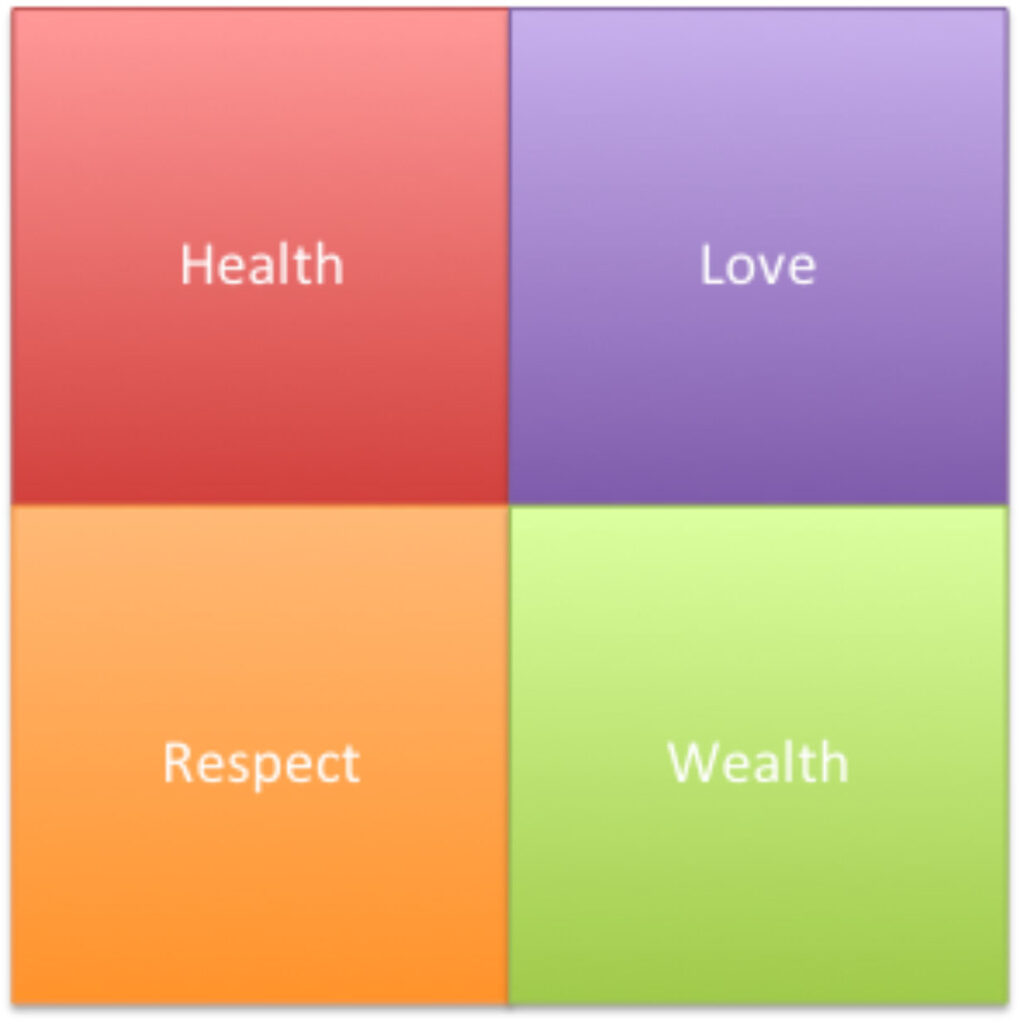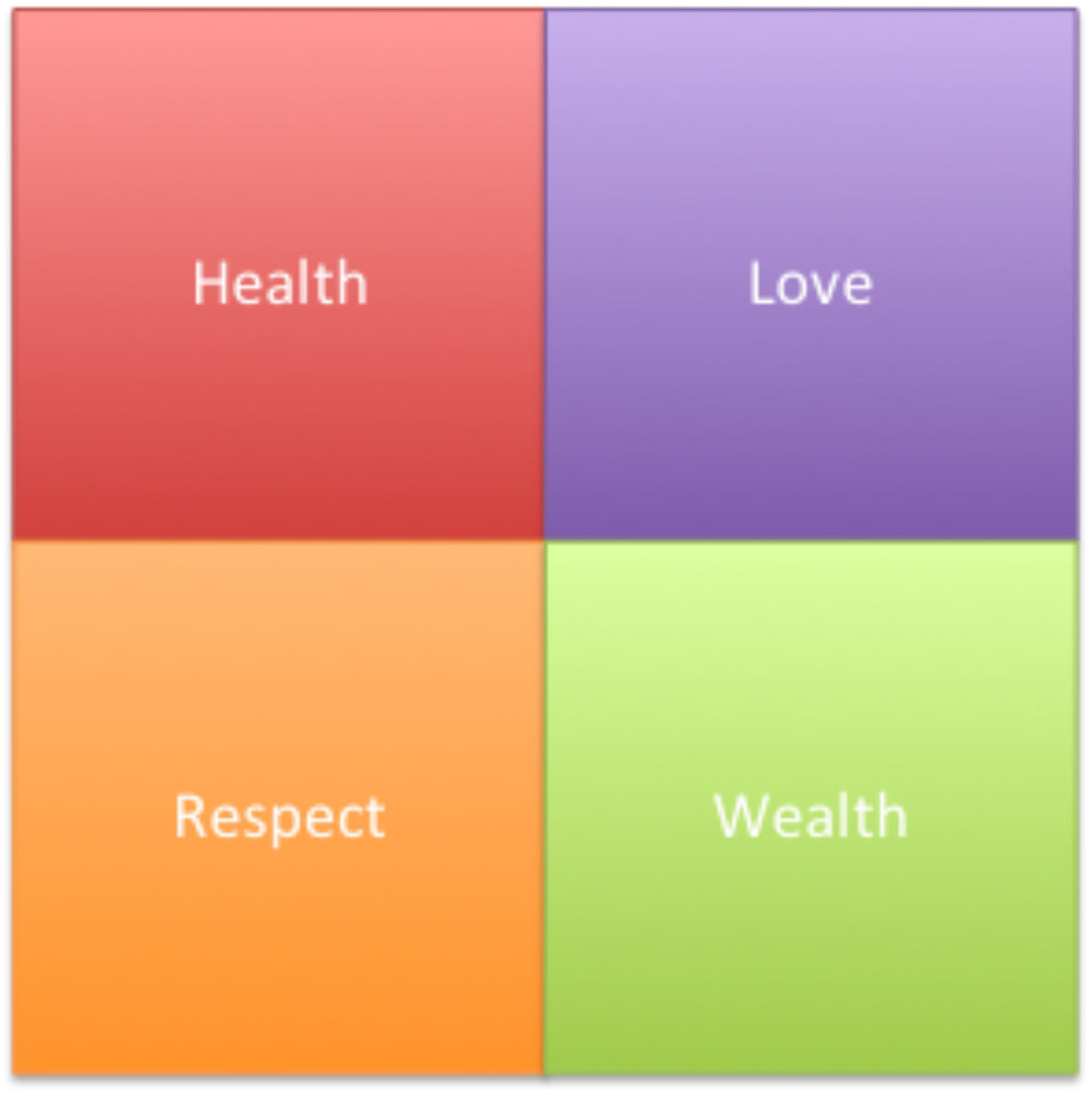Happiness is too complex a subject to cover in a blog post. But pursuing wealth without understanding its link to happiness can be harmful. I define happiness as a state of being that every human being aspires to. Since human aspirations are varied, everyone’s happiness is also a little different. Yet, as there are threads that bind humanity, so are there themes that are common to happiness. The question: “How can we be happy?” is so fundamental that it has absorbed the minds of philosophers for ages.

Before I repeat the conclusions of some of my favorite philosophers, let’s consider the four squares below.
The squares say ‘Health’, ‘Love’, ‘Respect’ and ‘Wealth’. Each square offers an example of a human need.
- Can a person who is very sick be happy?
- How about someone who lacks love, who has no close friends or family?
- Can a person who does not have the respect of others, and is treated as unimportant, be happy?
- Finally, can a person in extreme poverty be happy?
I consider Buddha to be one of the greatest philosophers of all time. He lived around 500BC; in short, a long time ago. Buddha was born a prince. He married, had a son, yet the sight of suffering led him to relinquish his princely life and seek higher understanding. His quest brought him to the conclusion that the cause of sorrow is unfulfillment of human desire, and therefore detachment is the way to happiness.
Being an applied mathematician, I think of Buddha’s conclusion as an asymptotic result, meaning something that is true at the extreme limit of self-control. At that limit, excruciating pain of a terminal disease, complete loss of family and friends, and extreme poverty would all fail to lower a person’s spirits. Most of us are not so strong. Buddhism acknowledges this too. Regardless of whether the ultimate goal (of Buddhahood) is actually reachable, one can make progress towards it. This was the state of our understanding of happiness circa 500BC (if not earlier).
The world we live in today is far more comfortable than Buddha’s. His world lacked electricity, running water, climate control, and modern medicine among other things. With time, our understanding of happiness has also evolved. The absence of pain or sorrow is not the same as happiness. The conclusion that we can influence (if not completely control) our happiness by changing our perception is a central idea of Positive Psychology. Evidence to support this idea has been found in psychology experiments as well as in studies on the structure and function of the human brain. The book “The Happiness Advantage” by Shawn Achor talks about some of these ideas.
Clearly, thinkers across thousands of years have concluded that our attitude greatly influences how much fulfilment we experience. Indeed, one of my favorite quotes is this one by John Milton:
“The mind is its own place, and in itself can make a heaven of hell, a hell of heaven.”
So then, why bother about money? One important reason is that most (if not all) of us are far from attaining the state of Buddhahood. Some desires are needs that are painful not to fulfil. If the cause of sorrow is unfulfilled desire, it helps to satisfy some needs, and have the maturity to understand that the stream of desires is endless; therefore, some of them will never be fulfilled. More importantly, our desires don’t all belong in the same league. While it may be immature to hanker after more money to keep up with one’s neighbors, the pursuit of financial security is often driven by a sense of duty towards one’s children, or a desire to not be a burden on others in old age. In the context of these goals, the pursuit of wealth is an act of responsibility as opposed to something detrimental.
I will end with a cliché: “Money is not everything.” In this quote, I could replace “money” with any other noun (except ‘everything’), and it would still hold true. But the fact remains that poverty leads to both real and perceived deprivation, and most humans find it hard to stay positive when they are very poor. Being financially independent helps.

One response to “Be happy. Be wealthy.”
Nice blog!